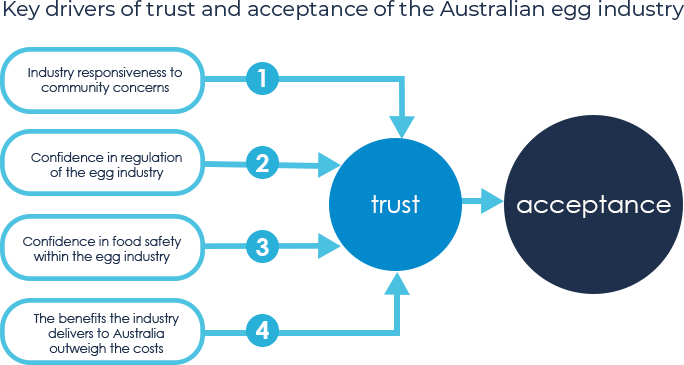Australian Eggs
Context
Australian Eggs (AE) engaged the Voconiq team, (who in 2018 were working in CSIRO), to explore the most productive way to engage the Australian community and ensure the industry was meeting community expectations.
Prior to this, industry issues had been addressed reactively with a pattern of conjecture and media attention making meaningful engagement difficult. We worked with AE to design a three-year, national research program to understand, and then address the key drivers of trust in and acceptance of the industry. AE also developed a sustainability framework to drive a cycle of engagement based on the content of the national survey instrument. The research program itself engaged more that 27,000 Australians directly which provided a cost-effective way to inform the community members of the interaction points with the egg industry.
The Challenge
At the commencement of the research program a key industry issue was conjecture around hen welfare issues driven by campaign organisations. To ensure this did not cloud the research outcomes, data was collected in two ways: through a controlled, nationally representative sample and via an ‘open call’ to anyone that wanted to participate. This resulted in two distinct datasets which allowed the industry to understand mainstream community perspectives and those that were highly engaged in welfare issues.
We could then show through analyses that the loudest voices (activists) were similar to average Australians on some issues, but very different on most issues, including demographic profile. This allowed us to turn a challenge into an asset, giving industry key insights into this group and confidence the views in media were not representative of the population as a whole.Solution
The design of this research allowed us to provide AE with a multi-layered understanding of community sentiment. We structured data collection to allow for a segment of the sample to be tracked across time (i.e. longitudinal) to compare their responses with those of new recruits in each of the two years following baseline in Year 1.
We also included location questions to enable geographic comparisons between urban, regional and remote community perspectives, as well as delivering insights based on exposure to the industry itself through social networks (i.e. how many people in the industry do you know). We collected this data online and developed new data science tools to deliver meaningful and attractive graphs and infographics to allow complex analyses to be conveyed in accessible ways.

Impact
Trust in, perceptions of responsiveness, and community acceptance of the egg industry increased significantly following baseline in Year 1. AE was successful in using the data to engage community via multiple channels, leading to an estimated 64.5 million media impressions over the three-year period.
AE was able to use the data to demonstrate to regulators and government stakeholders that the industry had and was increasing community confidence in its efforts to address community concerns such as hen welfare. Using the research, AE was also able to shift the internal industry approach and mindset around critics of the industry.Outcome
We were able to show the industry that Australians highly value what they do, and exactly how they could address animal welfare concerns in their practice. This led to a less defensive approach to engaging critical voices, and increased confidence within the industry to address sustainability issues constructively.
To take a look at the Australian Eggs project, visit australianeggs.org.au/news/strong-trust-egg-industry


